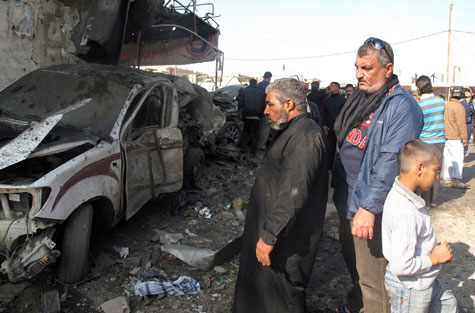
Karbala: Bombs targeting Shiite Muslims in areas south of Baghdad on Thursday killed 31 people and wounded 98, security and medical officials said.
The attacks marked the second wave of bombings against Shiites this week after three car bombs exploded near their places of worship in Baghdad on Tuesday, killing 12 people and wounding 50.
In Thursday’s attacks, two roadside bombs targeting a group of Shiite pilgrims in the city of Hilla killed 26 people and wounded 85, police and medical sources said.
The dead included two women, three children, two medics and a civil defence member, they said. Iraqi security forces cordoned off the area of the blasts and set up checkpoints in the city to search cars, an AFP correspondent said, adding that shops near the site were shuttered after the attack.
In the shrine city of Karbala, a car bomb exploded under a bridge, killing five people and wounding 13, a police spokesman and a medical official said. The spokesman said that security forces closed off all roads leading to the old city, where Imam Hussain, one of the most revered figures in Shiite Islam, is buried, and were searching for a second car bomb. Members of Iraq’s Shiite majority are often targeted by Sunni insurgents in bomb attacks. Millions of pilgrims flock to Karbala each year for Ashura commemorations marking Hussain’s death in battle in 680 AD, which peaked on November 25 this year. While pilgrims have often been targeted by bombings during Ashura that killed dozens, the commemorations were largely free of violence this year, though two attacks against pilgrims killed three people and wounded 35.
Pilgrims also walk from across Iraq to Karbala during the 40-day mourning period that follows Ashura. Violence in Iraq has decreased dramatically from its peak in 2006 and 2007, when brutal sectarian violence swept the country, but attacks remain common.












